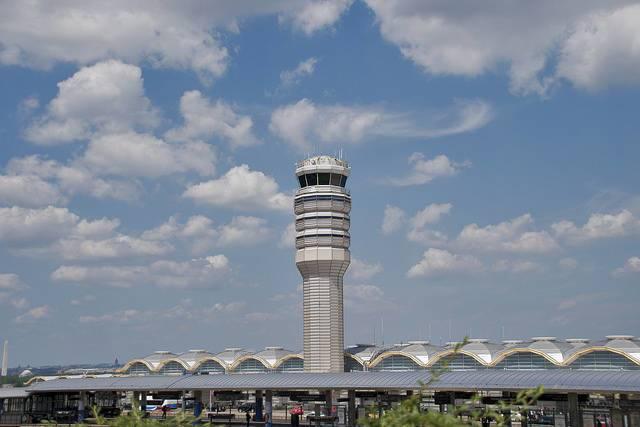
He may be backing out of the Paris Agreement, but if there is any silver lining in Donald Trump’s environmental policies, it is up in the sky: his plan to privatize the Federal Aviation Administration (FAA) could actually reduce the greenhouse gas emissions in the long run, albeit slightly. There are a few problems with the plan, however, including the fact the White House has not mentioned the potential environmental benefits.
Air travel is one transportation sector that is expected to change, or “transform,” very little in the coming years, and it is also expected to keep expanding as more passengers hit the skies. But with that growth come greater emissions, and there is little evidence that the sector will be able to improve on that metric. Many airlines have tinkered with biofuels in attempting to reduce their carbon footprint, but the problem has always been scalability. Therefore, if the current infrastructure governing American commercial aviation could become more efficient, emissions could actually decrease.
Trump’s plan, which includes a complete reorganization of air traffic control systems across the U.S., could accomplish exactly that. The FAA would be replaced with a “non-governmental entity,” though in reality it would be what is often described as a government sponsored enterprise (GSE) such as Fannie Mae, Sallie Mae or the Farm Credit System. The logic follows that no longer encumbered by government bureaucracy and kindred turf wars, a new aviation governing authority would reduce delays, allow planes to fly closer together and result in shorter and more direct flights requiring less fuel. The transition from the outdated radar-based system to one reliant on GPS, which supporters say would help make the sector far more efficient, would also occur at a faster pace.
Such changes are supposedly underway with the FAA’s “NextGen” modernization agenda, but the initiative is reportedly bogged down in bureaucratic delays, depending on the source cited. Airlines, which are enjoying record profits after decades of boom and bust cycles, are also part of the problem, as they see no incentive to change the system from how it currently operates, according to Michael Boyd on Forbes.
Whether this transformation of the FAA can become the reality presents a ‘yuge’ question mark. As with any bold agenda, it needs to be sold, and the current “negotiator-in-chief” has so far had a hard time selling the public and a recalcitrant Congress on many of his ideas. Furthermore, some influential congressional members of both political parties will be reluctant to let go of any oversight of the FAA. Selling his plan's potential climate benefits could actually help the proposal gain steam, as polls have indicated that a majority of Americans, as well as the business community, supported the idea of the U.S. remaining in the Paris Agreement. But Trump, whose rhetoric has long insisted that jobs and the environment are mutually exclusive, will not budge as he needs to maintain support amongst his base.
In addition there are also the stubborn questions related to costs. Currently the FAA charges a 7.5 percent excise fee on tickets; that would be eliminated if a privately-run organization takes its place. But that does not guarantee that prices would drop. The experience of consumers in other countries, such as Canada and the United Kingdom, showed that air ticket prices actually spiked as high as 59 percent. Airlines could simply impose their own fees, including the ones that are currently tucked into the cost of ticket prices. “Air travelers could be in for a bumpy ride,” concluded Jacob Passy on MarketWatch.
Writing for Vox, Alexia Fernández Campbell also suggested that airlines could impose additional fees that could make air travel more expensive for consumers. Under pressure to pay for the cost of modernizing the nation’s air traffic control system, airlines would have to find a way to cover their costs. You can bet that airlines will not front those costs – passengers will, and then some.
Image credit: Ron Gogswell/Flickr

Leon Kaye has written for 3p since 2010 and become executive editor in 2018. His previous work includes writing for the Guardian as well as other online and print publications. In addition, he's worked in sales executive roles within technology and financial research companies, as well as for a public relations firm, for which he consulted with one of the globe’s leading sustainability initiatives. Currently living in Central California, he’s traveled to 70-plus countries and has lived and worked in South Korea, the United Arab Emirates and Uruguay.
Leon’s an alum of Fresno State, the University of Maryland, Baltimore County and the University of Southern California's Marshall Business School. He enjoys traveling abroad as well as exploring California’s Central Coast and the Sierra Nevadas.














